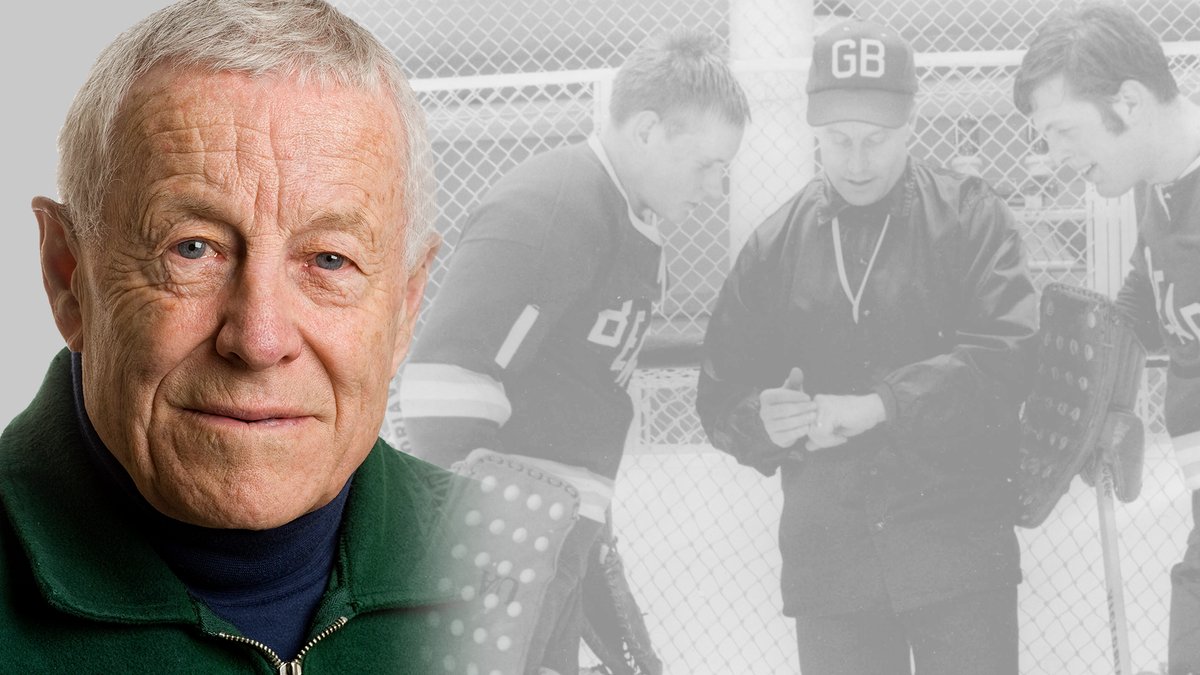Ken Hitchcock says much of the way hockey is played today comes from legendary University of Alberta coach Clare Drake.

Hall of Famer Drake, who died Sunday in his sleep at 89, drew accolades from across Canada for a career that saw him take the Golden Bears to six national championships and 17 conference titles in 28 seasons.
Many have called him an innovator whose ideas influenced a generation of coaches, including NHL veteran Hitchcock.
“He challenged the status quo on aggressive team play without the puck,” Hitchcock said Monday in a telephone interview.
“He was the first coach I knew who brought the aggressive style and pressure defence into the game.
“Defencemen pinching. Aggressive penalty killing. He coached a game in which the opponent was constantly under harassment in all three zones. Five-on-five. Five-on-four.”
He said Drake’s ideas were picked up by NHL teams, notably the great Edmonton Oilers teams of the 1980s, until they “became part of the fabric of the game.”
Hitchcock, who retired from coaching when the St. Louis Blues’ season ended and who is now a consultant for the Dallas Stars, was just as impressed with Drake’s generosity with other coaches. Instead of keeping his ideas to himself, he would freely share his data, sometimes even explaining to opposing coaches exactly how the Golden Bears beat them.
He recalled the coaching clinics across western Canada where Drake, Dave King, George Kingston, Bob Hindmarch and others working for Hockey Canada’s program of excellence would have beers with young coaches after their symposiums were done and continue the lessons for hours.
“I remember times we’d be in a bar and we’d run out of napkins because of all the things these guys would write on them, and at the end I’d pick them all up,” said Hitchcock. “He comes from a time of sharing and a lot of us are grateful for what he did.”
Watch below: Ken Hitchcock shares praise for Clare Drake, as the legendary hockey coach was inducted into the Hockey Hall of Fame. (File video from October 2017).

Drake did not spend his entire career in Alberta. He was the head coach of the Oilers in the defunct WHA in 1975-76 and was an assistant with the Winnipeg Jets in 1988-89. He also worked for Hockey Canada, coaching the Olympic team in 1980 and leading Canada to its first Spengler Cup title in 1984. And he acted as Hitchcock’s special teams adviser for Dallas during the late 1990s.
Watch below: Hockey Hall of Fame coach Clare Drake passed away over the weekend at the age of 89.

Hitchcock said Drake found pro hockey and its packed schedule of travel and games hectic. He preferred university hockey, where his team could practice four or five times during the week and play a couple of games on the weekend.
But he also spent a few years doubling as Alberta’s football coach, becoming the only bench boss to win national titles in two sports in 1967.
The current Alberta hockey coach, Ian Herbers, remembered how Drake was always studying the game, trying to make his teams better.
“He was always looking for ways to improve, he wasn’t satisfied with the status quo,” Herbers said. “And he always shared his ideas on how the game should be played with the players and coaches.”
Herbers’ first season as a player at Alberta in 1988-89 was Drake’s last as coach, but the six-foot-four defenceman stayed in touch and went on to become one of the many Golden Bears to go into coaching when he was done playing hockey.
What impressed Herbers most was that Drake did it without shouting at or belittling his players, but instead sharing his insights calmly but firmly. He often enlisted older players to help get the rookies up to speed.
Coaches across Canada paid tribute to him on social media.
Former national women’s team coach Daniele Sauvageau added:
Herb Madill coached McGill University in the 1970s and remembers encountering Drake at national coaches meetings.
“I think everybody wanted to pick Clare’s brain,” said Madill. “He was more low-key than the other coaches, but he was always willing to talk hockey with you, no matter where you were from.
“He was the dean of college hockey.”

Comments